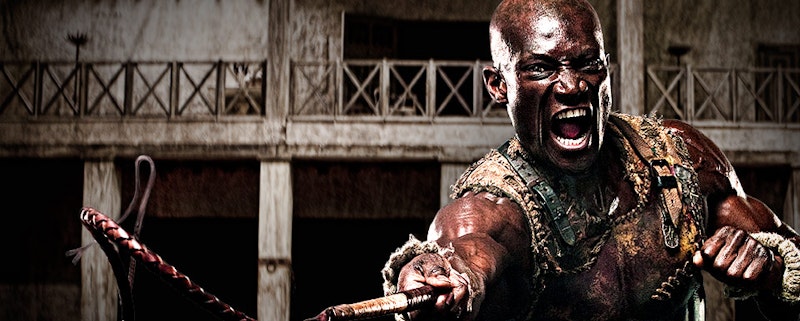I often feign indifference to the lower orders of entertainment. Wanton cinematized sex: I affect an unaffected yawn. Gratuitous violence: a pretend roll of my eyes. Formulaic writing that anesthetizes the intellect: I bite my thumb at you! But these are the gestures of a hypocrite, a viewer whose vulgar sensibilities enjoy safe passage in an opera house or Mapplethorpe exhibit but never in his own living room.
So was the spirit of my disapproval when a friend talked me into watching the first episode of Spartacus: Blood and Sand, a new series on Starz. The episode, with its abundance of slow-mo fight sequences, laughably copious blood-geysers and computer-generated abdominals struck me as a product of incest conceived in a three-way between HBO’s Rome, Frank Miller’s 300 and Ridley Scott’s Gladiator. Another sign of the show’s extra chromosome is the tendency of almost every actor to employ standard-issued British accents. The accents were so unseemly that I was reminded of the scene in 300 when King Leonidas, played by Gerard Butler, kills a Persian emissary while proclaiming in a Scottish brogue: “This-is-Sparta!” No, friends. This is lazy dialect coaching.
The first episode follows Spartacus (Andy Whitfield) as a legionnaire in the Roman army. The hero somehow angers his commanding officer and is sold into slavery (I wish I could tell you how, exactly, but the finer details escaped me in the deluge of computer-generated blood). Oppressed by the usual concerns of an underdog (restoring his besmirched name, getting home to his wife, etc.), Spartacus ends up in the house of Batiatus (John Hannah), a procurer of gladiators and violently ambitious socialite.
Weighed against the episode’s stronger features, which include just enough nudity and profane witticisms to sustain the attention of a predominantly male audience—ages 13 to 106—the formal elements were expectantly lackluster. Though I tended to doze off during scenes that didn’t contain gratuitous sex or violence, I was able to glean that the show apes Gladiator—but you can’t fault it that, as Gladiator mirrors the historically foggy tale of Spartacus, which in turn reflects our inherent thirst for heroes, villains, and rags-to-glory narratives. In short, I had seen it all before.
What, then, accounted for my decision to watch another episode—and another—and finally the whole season? Boredom? Or had I succumbed to the show because it was so bad—so bad—that it was actually kind of good? I think far more incipient forces were at play. In watching the first few episodes, I got the impression that I was being conditioned—like a lab-rat or a “rehabilitated” political dissident—to readjust my critical and ethical barometers. After watching a few more episodes and setting the dial to Rome, circa 73 BC, my psyche no longer perceived gladiatorial combat or slavery as explicit evils. Nor did I perceive the devices of hokey television as artistic failings; instead I began to realize that more enjoyment can be had when we acknowledge that originality is often a casualty in the battle to entertain—and Spartacus is nothing if not entertaining.
Much of the show’s appeal is embodied in the disclaimer that precedes each episode: “Spartacus depicts extreme sensuality, brutality, and language that some viewers may find objectionable. This show is a portrayal of ancient Roman society and the intensity of the content is to suggest an authentic representation of that period.” When taken literally, such a disclaimer suggests that ancient Romans were physical anomalies (as my friend noted, “How can so much blood come from one person?”) or that murder was a viable social expedient. So, yes, the disclaimer masquerades as an appeal to historical accuracy. However, anyone who has read Catullus knows that ancient Romans were just as foul-mouthed as modern man—and we can appreciate the similarities between ancient Roman vernacular and today’s slang. My friend and Spartacus-viewing companion often uses these colloquialisms to the describe weather: “It’s going to be hotter than Jupiter’s cock tomorrow. Better wear shorts.”
Language is one parallel the show draws between ancient Rome and modern society. Social ambition is another. The main backdrop for the drama—and the moments that sustain our attention in the absence of carnality—comprise each character’s scheme to improve his or her station in life. For the slaves and gladiators, many of whom maintain secret relationships with each other, this means bribing and blackmailing guards to secure a modicum of intimacy. For social aspirants like Batiatus, it means gaining the favor or patronage of a political luminary, whatever the cost—and here we find another timeless desire clearly and exuberantly evoked.
Finally, there is the parallel that Spartacus draws between the coliseum’s shouting mob and the average television audience; both are moved by the same theatrics, both are swayed by stylized blood-shed, and both epitomize the entrenchment of certain rules in entertainment. In spite of its often cheesy appropriations of the ancient-epic genre, or perhaps because of them, the first season of Spartacus deserves attention—if, for no better reason, than to prove that our tastes haven’t changed much in 2,000 years.

